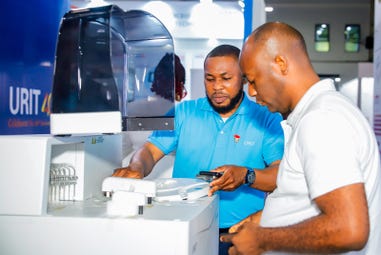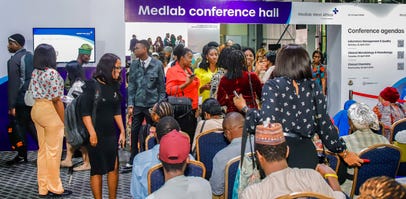Shaping the era of point-of-care with the best tools and methodologies was the centre of focus on Day 2 of Medlab West Africa as Dr. Japhet Erasmus Aisoni, Lecturer at Global Health and Infectious Diseases Control Institute, Nasarawa State University in Keffi, Nigeria, delivered a keynote address to highlight this phenomenon.
He stressed on the need to leverage new technologies to provide proper assistance to patients at critical points. While there is a shift towards point-of-care, it is important to understand this transformation and address concerns about job displacement due to technological advancements. He also urged a focus on best practices and upgrading resources to navigate this shift successfully. “We must move from the bench towards technology,” he stated, shedding light on the need to embrace point-of-care technologies for rapid diagnostics and data-driven decision-making.
Following these foundational insights, a panel comprising Dr. Donald Ibe Ofili, Director, and Deputy Registrar, MLSCN Accreditation Service, Medical Laboratory Science Council of Nigeria, Dr. Elochukwu Adibo, National President of the Guild of Private Medical Laboratory Directors of Nigeria, and Dr. Aisoni, along with moderator and Medical Parasitologist Chimere O. Agomo, brought diverse expertise to the discussion.
The panel went into more detail about possibilities and challenges with point-of-care testing. To guarantee the precision and dependability of medical devices, particularly in point-of-care testing, Dr. Adibo pressed home the regulatory obstacles and the necessity for clear regulations.

He emphasised the importance of professional oversight to prevent errors and ensure patient safety. He added: “Let's not be too excited about personal testing. Let's also be concerned about the credibility, reliability, and safety of these equipment. Data should be out there that sets standards for POCTs across companies.”
Additionally, he cautioned against overreliance on point-of-care testing results without proper validation and supervision, citing potentially fatal consequences. "There is a lot of poor strength and political will to let the people that should do their work, to do their work," he noted, underlining the need for regulatory support and accountability.
Dr. Francisca Obiageri Nwaokorie, Medical Microbiologist and Lecturer at the University of Lagos, Nigeria, discussed changes in data interpretation, information management, and ethics in molecular testing and genetic counseling. She pointed out the rapid evolution of technology and its impact on understanding genetic traits and diseases, particularly through advanced sequencing techniques like multiple array gene sequencing.
Moreover, she highlighted the significance of point-of-care testing for increased accessibility and reliability, alongside emerging technologies such as HTRAC and CRISPR for pathogen detection and gene alteration. "In the future, you will need to find where to operate, and when you do, you will need to find where and who to collaborate with," she advised and stressed on the importance of adaptation and collaboration in the ever-evolving landscape of healthcare technology.

The subsequent panel session on Future Molecular Diagnostics and New Diagnostic Technologies, moderated by Yakubu Ngwai, Professor of Pharmaceutical Microbiology, Nasarawa State University, Keffi, further explored these themes. Dr. Aminu Suleiman, Associate Director Laboratory Services, Walter Reed Army Institute of Research (WRAIR), USA Embassy in Nigeria, and Dr. Veronica Nnenna Victor Enya, Deputy Director Laboratory Services, Department of Public Health and Epidemiology, Nigerian Institute of Medical Research, Lagos, shared insights into future diagnostic technologies and molecular diagnostics, highlighting the potential for transformative advancements in healthcare.
In conclusion, the discussions underscored the critical importance of embracing technological advancements in shaping the future of healthcare. By leveraging new tools and methodologies, healthcare professionals can enhance patient care, improve diagnostic accuracy, encouraging a continuous learning culture among professionals especially with the intersection of technology and laboratory science while ultimately advancing the field of medicine.
Missed the chance to attend this year? Register for Medlab West Africa 2025 for free and gain exclusive access to the region's biggest healthcare industry event.
















.webp?width=700&auto=webp&quality=80&disable=upscale)